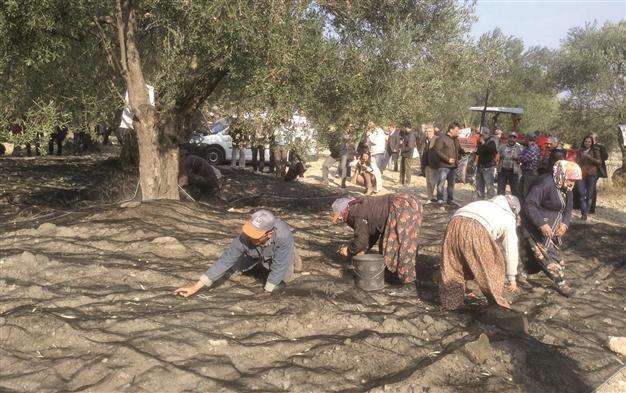Turkish olive producers set to join international networks
Barçın Yinanç

Olive harvests have taken place in the Aegean town of Ayvalık for thousands of years, but the Chamber of Commerce is just celebrating the 10th year of the festivities.
Facing common challenges, Turkish olive oil producers have decided to join hands with international networks. Producers from Edremit Bay have established the Turkish Olive Producing Towns Union in order to join the Mediterranean Olive Oil Cities Network, Re.Co.Med, which works to promote olive oil consumption worldwide.“I am a fourth generation olive oil producer. We are becoming increasingly poor each year. For the past six years, we have been selling our olives below production cost. Today, coming to this panel, I have seen women going to pick olives. I thought ‘what hard work they are doing.’ I felt sad we could not pay our workers better salaries.” You would think this was a Turkish producer talking, especially when these words are voiced over last weekend, only a day after 18 workers died in a traffic accident while they were traveling to go apple picking. There were 46 people in the van, despite it only having 24 seats, reflecting the sad reality of the effort to cut costs.
“We have been selling olives 35 percent below production costs,” said Soledad Serrano Lopez, a producer from Spain, which is the world’s top producer of olive oil and provides nearly half of global production. Serrano spoke at a panel hosted by the Ayvalık Chamber of Commerce, which organizes festivities at the beginning of the harvest season. Harvests have taken place in this Aegean part of Turkey for thousands of years, but the Chamber of Commerce is just celebrating the 10th year of the festivities.
Yet, each year brings increasingly less to celebrate, and Turkish farmers complain about the sector becoming less profitable. It seems they are not alone in complaining, because representatives from Spain and Italy, where producers receive an average 1.3 euro incentive compared to the 70 kuruş for Turkish farmers, as well as representatives from Jordan and Morocco, have all talked about the difficulties in the sector. In contrast with their international peers, Turkish producers are facing another challenge; a draft law that opens olive groves for mining. With an ever increasing hunger for energy consumption, the government has been pushing to amend a law that protects olive groves.
The government’s lust to open more mines seems not to be deterred by accidents, the latest of which took place last week, where 18 miners still trapped. The mining accident that happened five months ago that left 301 dead, coupled with a vigorous campaign by olive producers, has so far prevented the draft law from passing from Parliament. Yet, the bill is still waiting to be discussed in Parliament’s commission and farmers are fearing that in the event of it being passed, many owners will not resist selling their groves.
3.5 percent of world population buys olive oil
Still, the producers in Ayvalık want to hang on and have decided to join hands with international networks to cooperate against common challenges. “When we started out, our aim was to gain an international dimension, this dream is becoming true,” said İbrahim Kantarcı the head of the Ayvalık Chamber of Commerce.
“We believe that by organizing harvest festivities, where we invite all of the stakeholders, we are raising awareness. Ten years ago, the annual consumption per person was 900 grams, today it is nearly two kilograms,” said Rahmi Gencer, Kantarcı’s predecessor who was elected Ayvalık mayor last March. Two kg is quite low compared to the eight kg in Tunisia and 11.5 kg in Italy, both among the five largest producers in the world.
“3.5 percent of the world’s population buys olive oil and we want to increase this percentage,” said Elisa Skuda, secretary general of Re.Co.Med., which includes 13 Mediterranean countries.
“We are told olive oil is expensive compared to other oil. What has value is naturally more expensive,” said Serrano, head of QvExtra international, a nonprofit organization that gathers olive oil producing companies.
While Serrano talked about their work to target the U.S., where olive oil consumption is low, the secretary general of Re.Co.Med spoke of making use of UNESCO’s recognition of Mediterranean diet as intangible heritage 2010. Turkish producers will profit from international cooperation, because many realized for the first time that Turkey is not listed by UNESCO among the countries with a Mediterranean diet. They might begin by mobilizing Turkey’s UNESCO committee to apply for it to be included in the nations that uses the Mediterranean diet.
















